Circular economy lessons
Adolfo Villafiorita, head of the ICT4Good team at FBK, introduces the E-Mining @ School project, funded by EIT KIC RAW Materials, for students of vocational and high schools in five European countries
The growing spread of electronic devices determines an ever greater risk of throwing them in landfills and waste-to-energy plants causing soil, air and water pollution, with repercussions on human health.
Electrical and electronic equipment waste or simply electronic waste (sometimes also referred to as WEEE, acronym for Waste of electric and electronic equipment or e- waste), can be recycled thus activating the so-called circular economy, ie an economic system designed for self-regeneration by guaranteeing its ecological sustainability. In a circular economy material flows can be biological, capable of being reintegrated into the biosphere, or technical, destined to be upgraded without entering the biosphere.
The main issues arising from WEEE are the presence of substances considered to be toxic for the environment and the non-biodegradability of these devices.
The E-Mining@School project, promoted by Hub Innovazione Trentino in collaboration with FBK, University of Trento and many other international partners, sees students address a series of educational activities in the first place: lectures, laboratory activities, visits to e-waste recycling facilities, etc.

The first phase aims to convey the basics to understand the environmental, economic and social relevance of electronic waste management.
Later on, the students will get involved and organize WEEE collection campaigns: information on collected WEEE will be posted on an online platform for an international competition. Thanks to this, it will be possible to announce the group that has achieved the best results. The group of students (or a sub-group) that will generate the highest impact will be accompanied by a teacher from the school on an educational visit to Europe to meet the experts in raw materials and circular economy.
In other words, we have a mine at home: electronic waste can be recycled or repaired thanks to sustainable reuse and disposal. What makes the difference is the sensitivity of all citizens. For this reason, projects involving schools that pave the way for a change in fmindset and a higher sense of responsibility towards the environment and future generations are extremely important.
On Friday, May 17 2019, an information day was held at the ITT Buonarroti-Pozzo di Trento, one of the activities planned by the E-Mining@School project.
The project, co-sponsored by the EIT KIC Raw Materials, aims to raise awareness in more than a thousand young people and citizens in Europe on the topic of electronic waste, their life cycle and the business opportunities associated with them.
Students, in addition to information activities on WEEE, have participated in the collection of electrical and electronic equipment, showing citizens how to properly dispose of WEEE and at the same time make everyone more aware of the wealth hidden in these “waste”.
The meeting was also attended by Adolfo Villafiorita, FBK researcher and expert in the field, who discussed with students about technological waste, WEEE and the precious and rare elements they contain, whose disposal and supply comes with the mining of the Planet and the populations of third world countries.


